World Geography And Politics Daily News | 04 Jun 2023

Views (141)
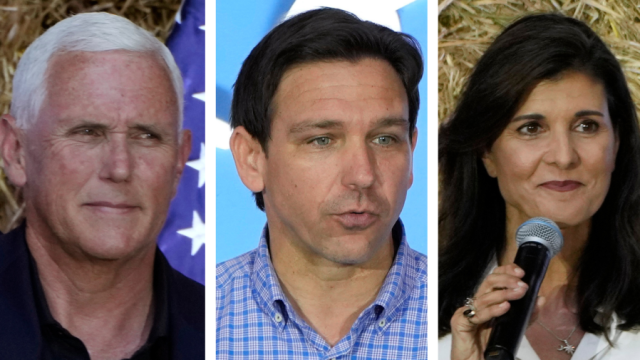
Sudan conflict: Caesarean by phone light - giving birth in a warzone
Women in Sudan's few remaining maternity wards are having babies to the sound of gunfire.
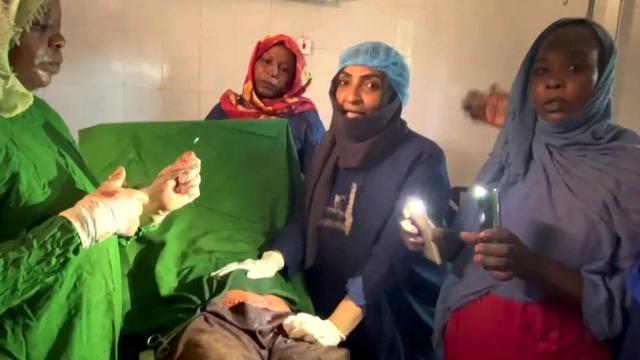
All but a few hospitals in Sudan's capital, Khartoum, have closed down because of the conflict raging there. Those that remain open often run out of power, making giving birth an even more stressful experience than usual for both the women and the healthcare workers trying to help them - especially if surgery is needed.
"We're relying on lights from mobile phones to perform a Caesarean," obstetrician Dr Howaida Ahmed al-Hassan said on a video shared with the BBC.
She recorded the footage as she was operating on a mother-to-be.
Her gloved hands can be seen applying pressure to the patient's chest and stomach as the Caesarean takes place.
The medics present - all women - surround Dr Hassan and hold their phones up to illuminate the area where an incision has been made.
Dr Hassan was one of the handful of obstetricians who remained at Alban Jadeed Hospital, in the north of Sudan's capital, Khartoum, for three consecutive weeks after heavy fighting erupted between military factions in April.
In the video she sent to the BBC, she showed wards with nurses assisting mothers giving birth under extremely tough conditions.
"The situation is really bad. We've stayed in the hospital for days and days. We've completely lost any sense of time. We don't know if it's day or night," Dr Hassan said.
"There is minimum medical staffing in the hospital, and in many cases the electricity cuts out and we have no gasoline to operate the generators for Caesareans."
She said the maternity ward in her hospital was packed with women in dire need of emergency obstetric care, many requiring Caesareans.
"We have taken high risks performing these Caesareans in dimly lit operating theatres. We do not have enough resources.
"We work in the absence of general anaesthesia consultants and specialists. We've had to discharge women only 10 hours after each Caesarean delivery."
In April, the UN Population Fund estimated 219,000 pregnant women were believed to be at risk, as heavy fighting raged around Khartoum, interspersed by fragile and failed ceasefires.
Near the beginning of the fighting it said that around 24,000 would give birth "in the coming weeks".
Bashayer al-Fadil was one of those women. She had a Caesarean just days after clashes erupted in Khartoum.
On a video call with the BBC she could be seen cradling her one-week-old baby girl, Omayma.
She said she was lucky to find a hospital that was still open and she was admitted amid sporadic gunfire.
"Explosions could be heard in the streets," Ms Fadil said.
Most hospitals in her area were not functioning, so she was only able to give birth in a hospital thanks to her network of contacts.
Only one out of every six hospitals in Khartoum is working at full capacity, according to the World Health Organization (WHO).
"I was trying to look for any hospital that would admit me for a Caesarean and I was lucky enough to find the hospital with help from my doctor and friends."
On the delivery day, Ms Fadil said she and her husband had to run through gunfire that swept across their neighbourhood, until they arrived safely at the hospital.
"I have given birth in tough circumstances. Even the simplest things, like water, were not available."
The new mother has not been able to get a birth certificate for her baby, nor give her essential vaccinations, as the violence continues to rage.
Ms Fadil's experience is not isolated. She said dozens of her pregnant friends had had difficulty getting to hospitals, and many had suffered miscarriages.
Omdurman Maternity Hospital, one of the largest of its kind in Sudan, closed its doors a few days after the clashes began.
Dr Kameel Kamal, a consultant gynaecologist there, told the BBC that most maternity hospitals in Sudan were now out of service. As a result, thousands of pregnant women faced dangerous complications, he said.
"Although there are no official statistics, we estimate large numbers of pregnant women are left to scream [in pain] in their homes.
"I'm sure there are lots of home deaths, haemorrhages, miscarriages, ectopic pregnancies, breech births, still births and many cases [of patients] who cannot get access to treatment," he said.
Dr Kamal warned that the fighting was taking a "disastrous toll" on pregnant women in Sudan.
Even before the conflict began, Sudan had among the highest number of maternal deaths in the world, according to the WHO.
Midwives are still playing a vital role with some continuing to make home visits.
Midwife Mawaheb, who did not give her surname, told the BBC she had helped around seven women have safe natural deliveries since fighting broke out.
"When I receive a phone call to be asked if I can help a woman in labour, I immediately head towards this woman's house without hesitation.
"In most cases, labour goes smoothly. If there is a problem or complication, I send the woman to the nearest functioning hospital," she said.
Despite the mounting odds in hospital, obstetrician Dr Hassan said medical staff try to keep spirits high and celebrate babies being delivered safely.
"We create lives, they kill us. We help two souls stay alive - a mother and a baby," she said.
Donald Trump Is Promising Peace In A Second Term. War With Iran Seems More Likely.
Trump is so focused on the Islamic Republic that he reportedly kept a document about it that he knew was classified after he left office. With global concern mounting over Iran's nuclear program, his volatility poses serious risk.
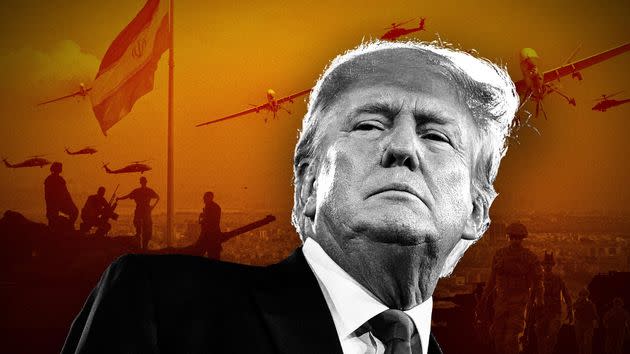
To hear Donald Trump tell it, a vote for him in 2024 is a vote for world peace.
The narrative serves Trump’s goal of seeming like an outsider fighting a flawed establishment and suits his strategy of seeking votes by appealing to Americans’ fears. But it ignores the issue that would likely pose the biggest foreign policy challenge of a second Trump presidency and one Trump has shown little capacity to handle peacefully: Iran.
“If he returns to power… I think the odds of him being able to deal with Iran are not promising at all,” said Ali Vaez, the director of the Iran project at the International Crisis Group think tank.
The Islamic Republic looms large for the former president.
And as president, Trump vetoed a bipartisan attempt to make it harder for him to order military action against Iran and reveled in torpedoing President Barack Obama’s landmark 2015 deal to limit Iranian nuclear development.
“Iran’s nuclear program is more advanced now than it has ever been,” one Western official said, describing his government as “extremely concerned.”
In 2018, then-President Donald Trump unilaterally withdrew the U.S. from the international agreement to limit Iran's nuclear program.
“Because of what he did by taking Iran’s nuclear program out of a box and putting it in a microwave, Iran actually has way more leverage than was the case when Trump walked into the Oval Office in 2017,” Vaez said. “If you look at Trump’s career, Iran’s nuclear program is the only thing that he failed to bankrupt.”
The upshot: Trump would face an unprecedented challenge ― with a proven record of seeing violence as the best response.
The Trump campaign did not respond to a request for comment.
Biden’s chance to address the nuclear issue has almost certainly slipped away.
After Trump withdrew the U.S. from the 2015 deal, the five other parties to the agreement ― France, Britain, China, Russia and Germany ― tried to sustain the accord. They pushed for Iran to comply with limits and monitoring requirements and tried to deliver some of the economic benefits for Iranians the deal was meant to provide.
The move frustrated world powers. “The Iranians chose not to take the deal,” argued the Western official, who was not authorized to comment on the record.
Iran knows “that if they go too far it would trigger a major crisis in the region,” the second Western official argued.
Its program is “obviously at a very advanced stage, but we shouldn’t necessarily assume that means they are on a path to a weapon,” the first Western official said. “If they want to come to the table and act in good faith, then we’re open to talking.”
Vaez, the analyst, believes both Tehran and Washington “would like to put a lid on the situation until there is less uncertainty about the political trajectory of the United States.”
Such a compromise could “create time and space for both sides until they know who the next U.S. president would be,” Vaez said. “I don’t expect a deal that would resolve the nuclear crisis in a sustainable fashion.”
The combination of an urgent nuclear question and a reelected Trump is almost certainly explosive.
An essential factor in any renewed agreement would be shifting Iran’s calculus: convincing Tehran it is worthwhile to change its current course and address international concerns about weapon development.
It’s hard to see how Trump would inspire goodwill in the regime.
His unilateral withdrawal from the 2015 deal ― despite Iran’s general compliance ― began the current crisis. And his killing of Iranian leader Qassem Soleimani is considered an Iranian national tragedy.
“There’s just so much bad blood there between the Iranian leadership and him as a result of that single act,” Vaez said. “What the Iranians want to do to him is not to shake his hand but to put a dagger in his back.”
Trump's killing of Iranian general Qassem Soleimani in 2020 sparked fears of U.S.-Iran war and ignited protests worldwide, such as this one in Seoul, South Korea.
Meanwhile, Trump’s talk of “peace through strength” suggests he would be loath to suggest the kind of U.S. steps that could inspire serious talks by, for instance, easing up on his historic “maximum pressure” approach to the Islamic Republic.
Iran could, in fact, interpret Trump’s return as an impetus to become more assertive and speed closer to possessing weapon-grade material, observers worry. Though Tehran’s dialogue with its regional rivals ― notably Saudi Arabia ― has inspired some calm in the Middle East, it also makes it easier to envision an Iran-U.S. conflict in which the Saudis and other U.S. partners dodge fire as Washington and Tehran focus on each other.
Trump’s demonstrated instincts and stated second-term goals pose further hurdles to diplomacy.
One of the Western officials said his government believes Beijing could be a moderating influence in any eventual settlement on the nuclear issue.
“China does not want a crisis in the region that would impact heavily its supply of oil and energy, and they don’t want to have a new member of the nuclear club,” the official said.
China’s heft has grown because sanctions have made Iran extremely dependent on earning money by selling oil to Beijing, noted the other Western official, calling that sway “a significant lever.”
Still, “it remains to be seen to what extent the Chinese are willing to use that lever,” the official continued.
To Vaez, another Trump term in the White House means an Iran policy of perpetual danger.
“It’s a formula for another four years of confrontation between Iran and the U.S. without any possible offramps,” he said.
Russia, China seek world power 'rebalancing' with G7-alternative: 'indispensable mechanism'
The BRICS economic bloc has discussed and accepted applications for new members, including Iran and Saudi Arabia as well as some unnamed European countries.
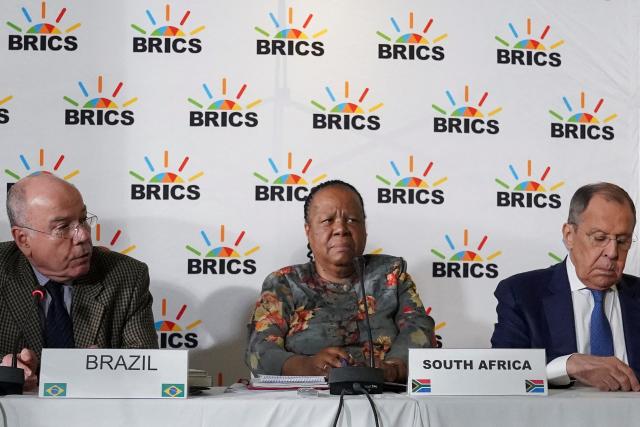
Foreign ministers of the nations comprising a China and Russia-led economic bloc have made clear that they intend to rebalance global power, claiming to aim for a "multipolar" dynamic even as they work to place themselves at the center.
Jaishankar stressed that the five nations comprising the group needed to "send out a strong message that the world is multipolar, that it is rebalancing and that old ways cannot address new situations."
"I believe the enlargement of BRICS will be beneficial to the BRICS countries," he said, claiming the group was "inclusive … in sharp contrast to some countries’ small circle." Russian Foreign Minister Sergei Lavrov said that some dozen or so nations had shown interest in joining, and South Africa’s BRICS ambassador Anil Sooklal said that countries from Europe have asked about joining, according to South African outlet News 24.
Brazilian Foreign Minister Mauro Vieira called the group an "indispensable mechanism" to balance against the Western influence of the G7, which is made up of the U.S., Japan, Canada, Britain, France, Italy and Germany.
"Russia attaches enormous importance to the development of this format of integration. And Russia will take part in this summit at the proper level," Russian press secretary Dmitry Peskov said during a recent press conference. "Of course, we count as a bare minimum on partner countries in such an important format not being guided by such illegal decisions."
Fox News Digital’s Caitlin McFall and Reuters contributed to this report.
Three Israeli soldiers killed near Egypt border
The incident came after a drug smuggling operation was thwarted at the border, the army says.
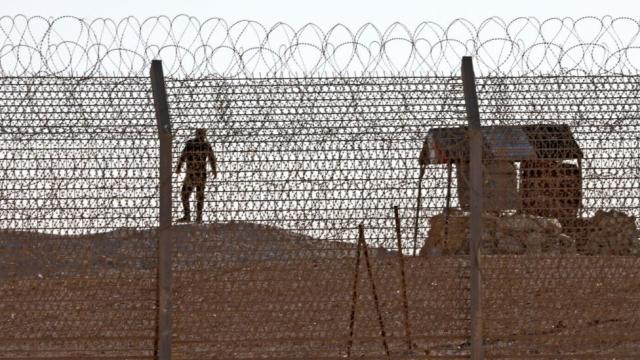
Three Israeli soldiers have been killed by an Egyptian security officer in exchanges of fire on the Israeli side of the border.
The armed forces of both countries say they are jointly investigating the unusual incident.
Egypt says its officer crossed into Israel while chasing drug traffickers.
The Israeli military has said the shootings were assumed to be connected with a drug smuggling operation it had thwarted overnight.
According to the army, two Israeli soldiers - a man and woman - posted in a remote spot along the border were shot dead early on Saturday morning.
Their bodies were discovered after a senior officer was unable to contact them by radio.
Hours later, after a search operation, the alleged attacker was encircled and there was a shootout, the Israeli military says.
A third soldier was killed, along with the gunman, who it said was an Egyptian policeman. Another soldier was wounded in that exchange.
In a vaguely worded statement, the Egyptian military said that its security officer was pursuing drug smugglers and that a shooting led to the Israeli deaths.
It also conveyed "sincere condolences" to the families of the victims.
The Israeli military says contraband worth about $400,000 was seized by its forces during the overnight operation against smugglers.
Soldiers are continuing to search in the area for others that may have been involved, the army says. It is not clear how the policeman managed to enter Israel from Egypt.
Israeli media say the attacks happened between Mount Harif and Mount Sagi - which lie in the Negev desert, about half-way between the Mediterranean coast and the Red Sea Egyptian resort of Eilat.
Israeli military spokesman Richard Hecht told journalists: "Co-operation with the Egyptians is ongoing, it's good. This is not geopolitical."
This appears to be one of the most serious border incidents since Egypt became the first Arab country to sign a peace treaty with Israel in 1979.
Although the two states are often described as having "a cold peace" in recent years, they have worked together closely on military and intelligence matters, particularly on counter-terrorism.
The Israeli air force has supported the Egyptian army in its fight against so-called Islamic State militants in the northern part of the Sinai Peninsula.
The most serious infiltration attempt in recent times took place in 2012.
Back then, militants attacked an Egyptian checkpoint near to Rafah on the border with the Gaza Strip, killing 16 Egyptian policemen and stealing two armoured cars.
They used these to break through the Kerem Shalom border crossing with Israel where one of the vehicles exploded. After a firefight, Israel said the bodies of eight attackers were found.
In the past decade, Israel has built a tall border fence to try to keep out militants and to stop people-smuggling from Egypt - in particular migrants crossing from sub-Saharan Africa.
However, drug smuggling attempts in the area remain frequent. The border stretches some 255km (160 miles), making it difficult for security patrols.
Recent years have seen several cases of gunfire between smugglers and Israeli soldiers. The Egyptian army has also shot at drug smugglers and jihadists which has occasionally led to accidental cross-border fire.
Last December, Israeli soldiers shot dead a suspect who was apparently trying to smuggle drugs into Israel.
Ghetto Kids: Winning Britain's Got Talent would mean a bigger house in Uganda
A group of Ugandan children is on the verge of glory after reaching the final of Britain's Got Talent.
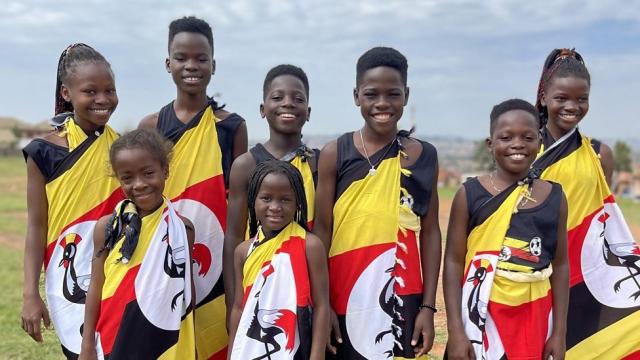
A group of Ugandan children is on the verge of glory after reaching the final of hit UK talent show Britain's Got Talent, where they have won over the judges and the public with their dazzling dance moves and bubbly personalities.
They have already made history after becoming the first act to be given a "golden buzzer" by one of the judges before they had even finished their performance. This sent them straight through to Wednesday's semi-final, where they received most public votes, meaning they are now among the 10 acts taking part in Sunday's final.
The group of six children aged between five and 13 all come from impoverished backgrounds in the Ugandan capital, Kampala, where they were taken in and cared for by their guardian-turned manager Dauda Kavuma.
He told the BBC that he hopes their success can encourage other children living in similar circumstances.
"We feel so happy to keep doing this and to bring hope to all the children around the world who are in the ghetto, who are disadvantaged, who are less privileged - that they can make it in life."
While they are winning over a new audience in the UK, the Ghetto Kids are already a global internet sensation and performed at the 2022 World Cup in Qatar.
But one of the group, Priscilla Zawedde, 13, told the BBC that winning the TV show - and the £250,000 ($313,000) prize money - would mean "a bigger house for everyone".
Some 30 children currently share a five-bedroom house in Kampala, where they are looked after by Kavuma.
He set up the Inspire Ghetto Kids Foundation in 2007 to care for street children in the Kampala neighbourhood of Makindye and told the AFP news agency that having a bigger house would be a "dream" as the children would have more space.
They currently rely on donations from well-wishers, earnings from their social media posts as well as fees for live performances.
Kavuma also started life on the street before he was given a chance by a man who spotted him playing football and asked him if he wanted to go to school.
"He let me join his team and helped me pay my school fees. He was someone who helped me without knowing me. So from that day, I promised myself that when I grow up I'd hope to help a child one day," Kavuma told the BBC.
But he then switched to music, which he is now using to transform the lives of others.
"Most people thought street kids... have no value in society but I thought otherwise," he told AFP.
"I thought: 'What if I use music, dance and drama to transform the underprivileged in the ghettos?'" he says.
Akram Muyana, 13, told the BBC that dancing had always been his way of escaping reality after his father died.
"Whenever I dance, I feel so happy, and my stress goes away. I started going to churches to dance to get money to give my mother for her to buy me clothes and food."
GOP hopefuls slam Trump for comments praising Kim Jong Un
Several Republican presidential hopefuls slammed former President Trump for his comments praising North Korean leader Kim Jong Un on Saturday, after the country received a seat on the World Health Organization’s (WHO) executive board. Former Vice President Mike Pence, former U.S. ambassador to the United Nations Nikki Haley and Florida Gov. Ron DeSantis all criticized…
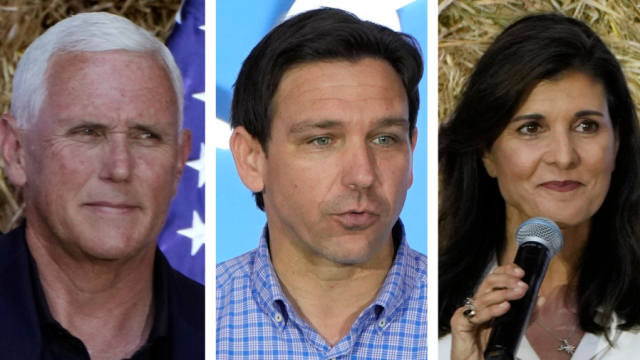
Several Republican presidential hopefuls slammed former President Trump for his comments praising North Korean leader Kim Jong Un on Saturday, after the country received a seat on the World Health Organization’s (WHO) executive board.
The former Indiana governor also attacked the organization, claiming it “let America and the world down” during the COVID-19 pandemic.
“I mean, they literally were complicitous in covering up what was happening in China, and we held them to account during our administration.”
“You don’t congratulate a thug,” she added on Saturday, when asked about Trump’s comment. “I mean, let’s keep in mind, this thug has threatened America, has threatened our allies, over and over again.”
“This is not something to play with,” Haley continued. “I mean, he’s a terrible individual. He’s terrible to his people, he’s terrible to our allies in the world, and I don’t think he deserves congratulations.”
All three were in Des Moines on Saturday for Sen. Joni Ernst’s (R-Iowa) annual Roast and Ride fundraiser.
0 Likes
